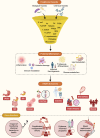Overview of foodborne hazards associated with inflammation and metabolic health
- PMID: 40200316
- PMCID: PMC11980346
- DOI: 10.1186/s44263-025-00150-0
Overview of foodborne hazards associated with inflammation and metabolic health
Abstract
Access to safe and nutritious food is key to ensuring health and well-being and is critical to meeting the United Nations' Sustainable Development Goals. However, a synthesis of the associations between foodborne illness and malnutrition, such as metabolic health, remains a gap in the literature base. In this review, we summarized existing evidence on the impacts of biological and chemical hazards on nutrition-related health outcomes, specifically overweight and obesity, inflammation, metabolic disease, thyroid function, cancer development, and adverse birth outcomes, examining physiological mechanisms, epidemiological associations, and animal studies. Mechanisms between some foodborne hazards, such as H. pylori, and adverse pregnancy outcomes, e.g., gestational diabetes mellitus, or between nitrates and impaired thyroid function, are relatively well-studied. However, evidence on the effects of many other chemical hazards on metabolic and human health remains limited: for example, while arsenic exposure is associated with adverse birth outcomes, the limited availability of dose-response studies and other challenges limit ascertaining its causal role. Untangling these associations and physiological mechanisms is of high relevance for both high- as well as low- and middle-income countries. Emerging technologies and novel assessment techniques are needed to improve the detection and understanding of understudied and complex foodborne diseases, particularly those arising from chemical hazards. These evidence gaps are highlighted in this review, as well as the need for establishing surveillance systems for monitoring foodborne diseases and metabolic health outcomes across populations.
Keywords: Biological hazards; Chemical hazards; Foodborne disease; Metabolic health; Nutrition.
© 2025. The Author(s).
Conflict of interest statement
Declarations. Ethics approval and consent to participate: Not applicable. Consent for publication: Not applicable. Competing interests: SM declares no conflict related to this topic. In the interest of full disclosure, SM is an unpaid board member and holds equity in VitaScan, a startup commercializing technology for point-of-care assays for nutritional status partially developed in his research laboratory at Cornell University. The remaining authors declare no competing interests.
Figures

References
-
- Jaffee S, Spencer H, Laurian U, Delia G, Emilie C: The safe food imperative: accelerating progress in low-and middleincome countries. In: Agriculture and Food Series. Washington D.C.: World Bank; 2019. Accessed from: http://hdl.handle.net/10986/30568.
-
- Institute for Health Metrics and Evaluation: Findings from the global burden of disease study 2017. In: Global Burden of Disease. Seattle, WA; 2017.
-
- Global Burden of Disease: Global burden of disease study results. 2019. Accessed from: https://ghdx.healthdata.org/gbd-2019.
-
- US Agency for International Development: Diets and food safety: U.S. government’s global food security strategy activity design guidance. In: Feed the Future; 2022.
-
- United Nations: Transforming our world: the 2030 agenda for sustainable development. A/RES/70/1. 2015. Accessed from: https://docs.un.org/en/A/RES/70/1.
Publication types
Grants and funding
LinkOut - more resources
Full Text Sources
Miscellaneous
